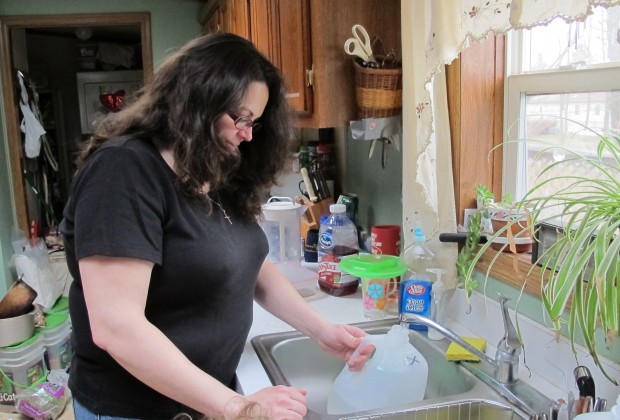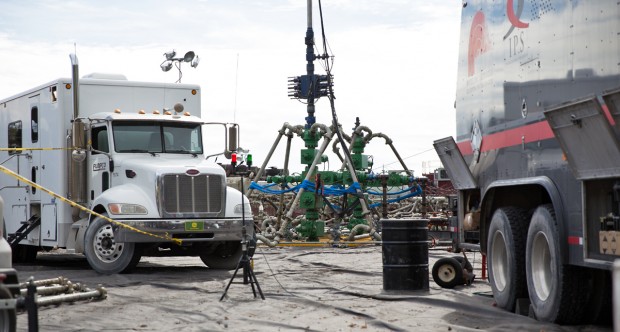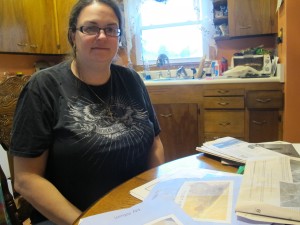After New York ban, Pennsylvania renews focus on fracking health impacts
-
Katie Colaneri
New York State banned fracking earlier this month, citing the potential risks to public health. In Pennsylvania, where shale gas drilling has boomed, the state has not studied those risks systematically and some say, deliberately ignored them. A new governor says he wants to take a different approach.
At a news conference the day after New York announced its ban, Pennsylvania’s Democratic Governor-elect Tom Wolf summed up his views on fracking:
“I want to have my cake and eat it, too,” he said. “I don’t want to do what New York did.”
Wolf wants a new tax on drilling to pay for a lot of his priorities like education. He also wants to create a health registry to measure the potential impacts of heavy drilling.
“In the absence of a strong concern for health, you have problems,” he said. “I think we ought to do this right.”
The drilling health registry is not a new idea for Pennsylvania.
In 2011, outgoing Republican Governor Tom Corbett’s Marcellus Shale Advisory Commission recommended a long-term program to monitor the health of residents within one mile of natural gas development sites and to fully investigate any complaints. However, the state Department of Health has never received the funding to do the work and the intersection of public health and fracking remains a thorny issue in Harrisburg.
Black water, then strange symptoms
But if state health officials ever came to Kim McEvoy’s neighborhood, she’d have a lot to say.
In 2011, her water turned grey. Then, “coal black,” she said.
McEvoy is one of several residents of the Woodlands – a rural community in Butler County, western Pennsylvania – who have complained that natural gas development has damaged their water supplies and their health.
One night, McEvoy says she almost fainted while taking a shower.
“I still had soap on my body and I just got out of the shower and I’m like, ‘I am so dizzy, I can’t even stand,’” she remembers.
McEvoy’s fiancé helped her to the bed where she sat, wet and soapy, trying to stay conscious.
“Just take a break, take a break,” he told her.
That wasn’t the last shower episode. Also, McEvoy’s long black hair began falling out in clumps and her fingernails began to grow strangely, curving with grooves and ridges.

Susan Phillips/ StateImpact Pennsylvania
Kim McEvoy fills up a jug of water at her former home in Butler County in this 2012 file photo. She says after natural gas drilling began, her water turned grey and black. Then, she began experiencing strange physical symptoms.
Her symptoms started going away, she says, only when she stopped using her well water. The company drilling and fracking nearby provided her for a while with a storage tank known as a “water buffalo.”
McEvoy had no health insurance and no primary care doctor. So she called the state Department of Health, but the person who answered the phone told her to call the Department of Environmental Protection instead.
“They have no departments handling anything that had to do with gas and oil drilling. They told me that. Then they said, ‘You need to call the DEP,’” she said. “Well, [they] didn’t care if my hair was falling out.”
The DEP had already told McEvoy and her neighbors that gas drilling did not contaminate their water wells.
Health Department officials say they have referred fracking-related complaints to their epidemiology experts, who have investigated fully.
But two former staffers say the Department of Health had policies in place that kept them quiet about fracking.
Former staffers accuse Pa. of ignoring health complaints
In 2012, health department officials circulated a list of drilling-related “buzzwords” to its community health staff. The list included phrases like “hair falling out,” “skin rash” and “fracking.” Callers mentioning these words were to be directed to the department’s Bureau of Epidemiology.
The two retired staffers told StateImpact Pennsylvania earlier this year that they were also instructed not to discuss callers’ concerns at any length and not to give them any information.
The Department of Health continues to dispute the former employees’ claims and says it fully investigates all health complaints.
Celeen Miller is a volunteer public health advocate in Bucks County who estimates she has helped about a dozen people like Kim McEvoy lodge complaints. She doesn’t believe the Health Department under Governor Corbett has fully investigated drilling-related concerns.
In 2011, people began reaching out to Miller when they “hit a wall” with staff at the department’s regional offices who told them to contact the DEP instead. Early the following year, she began arranging conference calls with staff at the Bureau of Epidemiology.
“People talked about headaches, dizziness when they took a shower, rashes on their arms when water touched their body, dogs throwing up, children getting sick,” Miller said. “Some of the calls were so upsetting that I felt very teary-eyed after we hung up.”
The Department of Health claims it has logged 76 complaints, but has found no link between drilling and illness. The department has refused to release information about the location, the nature or any resolution of these complaints.
Miller argues the agency has not given its staff the time or the resources to do its job.
“Our elected officials could empower the health department either through policy or regulation to do more,” she said. “We’ve lost 3 and a half years at least of doing some meaningful investigation on drilling operations and its impact on water and land and on people’s health.”
Last August, in response to the former staffers’ allegations, the Department of Health announced changes to its policies for handling complaints about gas drilling – including regular updates to its website and bi-weekly meetings with the Department of Environmental Protection.
The Department of Health declined an interview request to discuss the changes for this story.
“Through the improvements announced earlier this summer, we have enhanced our efforts and continue our ongoing commitment to prioritizing the health needs of Pennsylvanians,” said spokeswoman Holli Senior in a statement.
Miller has seen some positive changes over the last five months. For example, she says state health officials no longer rely on people filing complaints to send them water test results.
“Now the Department of Health representatives will offer to get the lab results directly from the DEP and that is an important change,” she said, noting many of the people she works with may not have access to the Internet or a fax machine. Some of them are worried that sharing documents could compromise their lawsuits against drilling companies.
“They don’t care”
Miller is optimistic that the Wolf administration will push for a more proactive approach. However, the health registry idea has never won favor with Republican leaders in the state legislature.
“What we don’t want is something that unnecessarily scares residents in the district,” said Drew Crompton, a spokesman for Senate President Pro Tempore Joe Scarnati (R-Jefferson).
“We want the public health effects to be known, but we also don’t want people just showing up at people’s doors saying, ‘We would like you to be a participant in this study because we believe that Marcellus Shale drilling is having adverse effects on your health.’”
Crompton says Scarnati plans to reintroduce a bill creating an advisory panel that would review research on drilling and health. That bill never made it out of committee last year.
Meanwhile, Kim McEvoy wonders why her state government seemed so uninterested in finding out why she was getting dizzy, losing her hair, and watching her fingernails change shape.
“You would think they would be caring about the health and wellbeing of Pennsylvanians, but apparently they did not,” she said. “That’s how I felt like well, they don’t care.”
In 2012, when McEvoy grew tired of living with discolored water, she packed up her family and moved to another town. She says she was forced to foreclose on her home because no one wanted to buy a house with bad water.


















